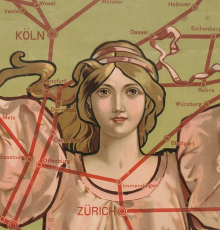Categories
The Age of Railways - how the invention of trains shaped European society

How did the invention of the railway transform space and time? What role did trains play in the emancipation of women during this period? Can rail transport play a part in today’s fight against climate change?
During this online debate, researchers, historians and scholars will explore these topics by examining the social, economic and cultural impact of trains and railways on European societies and culture, from the second half of the nineteenth century to the present day. Join us for a lively discussion and take part in the debate with your own questions and comments.
Featuring:
- Andrea Giuntini - Associate Professor of Economic History, University of Modena and Reggio Emilia
- Anna Despotopoulou - Professor of English Literature and Culture at the National and Kapodistrian University of Athens
- Jan Musekamp - Visiting Associate Professor at the Department of History and European Studies Center, University of Pittsburgh.
- Marie-Noëlle Polino - Responsible for heritage and public history projects at the SNCF (French national railway).
Moderator: Kieran Burns, Curator at the House of European History
Introduction by Constanze Itzel, Museum Director of the House of European History.
Language: English
--------------------------------------------
Andrea Giuntini is an Associate Professor of Economic History at the University of Modena and Reggio Emilia, Faculty of Economics. His main fields of research are: history of networks, energy, transport and communications, public infrastructure, urban history. He is member of several scientific associations: AISU (Associazione italiana di storia urbana), ASSI (Associazione di Storia e Studi sull’Impresa), EBHA (European Business History Association), IRHA (International Railway History Association), SISE (Società Italiana Storici dell’Economia), SISSCO (Società Italiana di Storia Contemporanea), Tensions of Europe, T2M (Transport, traffic and mobility), and Amici di Memoria e ricerca. Dr. Giuntini is on the editorial boards of the following journals: Ricerche Storiche, Memoria e Ricerca, The Journal of Transport History, Transportes, servicios y telecomunicaciones, Archivio per la storia postale, Antologia Vieusseux, Storia economica.
Anna Despotopoulou is Professor in English Literature and Culture at the National and Kapodistrian University of Athens. She is the author of Women and the Railway, 1850-1915 (Edinburgh UP, 2015) and her research interests include Victorian literature, mobility and gender studies. Her articles on authors such as Henry James, George Eliot, Jane Austen, Christina Rossetti, Rhoda Broughton, and Flora Annie Steel have been published in academic books and journals such as The Henry James Review, Modern Fiction Studies, Studies in the Novel, and Review of English Studies. Books she has co-edited include Henry James and the Supernatural (Palgrave-Macmillan, 2011), Transforming Henry James (Cambridge Scholars, 2013), and Ruins in the Literary and Cultural Imagination (Palgrave-Macmillan, 2019). She is the Principal Investigator of the research project “Hotels and the Modern Subject, 1890-1940,” funded by the Hellenic Foundation for Research and Innovation (2020-2022), and also participates in the research project “Representations of Modern Greece in Victorian Popular Culture”. She is currently on the board of the Henry James Society (2021-23).
Jan Musekamp is visiting associate professor at the University of Pittsburgh/Pennsylvania (Department of History and European Studies Center). Previously, he taught Eastern European History at the European University Viadrina and was postdoctoral fellow at Washington University in St. Louis/Missouri. In his teaching and research, he focuses on East Central European cultural and migration history in the nineteenth and twentieth centuries. His main areas of interest are questions of mobility, (forced) migrations, cultural appropriation in Eastern European borderlands, and transnational history. In his first book, Jan focuses on forced migrations and cultural appropriation in the Polish border city of Szczecin between 1945 and 2005. He is currently preparing his second book for publication (From Paris to St. Petersburg and from Kaunas to New York. A Cultural History of Transnational Mobility in East Central Europe). The manuscript analyzes the impact of the railroad on the development of international networks in the nineteenth century. His new research project deals with the history of Volhynia’s German speakers as a transnational history of migration and integration.
Marie-Noëlle Polino graduated in humanities in Paris (Ecole Normale Supérieure) and was the head of the French Railway historical Association from it beginning till 2017. She is now in charge of heritage and public history projects at the French national railways. Her teaching and writing deal with industrial heritage, railway heritage, oral history and WW2.








